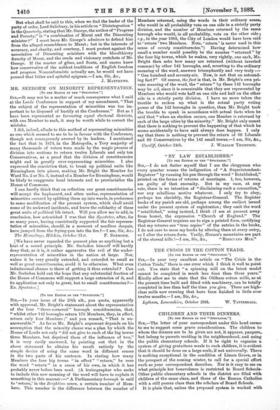MR. SEEBOHM ON MINORITY REPRESENTATION. go THE EDITOR Or THE
"SPECTATOR."] SIE,—It may not be a matter of much consequence what I said at the Leeds Conference in support of my amendment, "That the subject of the representation of minorities was too im- portant to be disposed of hastily at the Conference." But as I have been represented as favouring equal electoral districts, with one Member to each, it may be worth while to correct the mistake.
I did, indeed, allude to this method of representing minorities as one which seemed to me to be in favour with the Conference, though not courageously avowed by its leaders. I mentioned the fact that in 1874, in the Metropolis, a Tory majority of many thousands of voters were made by the magic process of division into sections to return twelve Liberals and only ten Conservatives, as a proof that the division of constituencies might end in greatly over-representing minorities. I also expressed the conviction that, to break up political units like Birmingham into pieces, making Mr. Bright the Member for Ward No. 2 or No. 3, instead of a Member for Birmingham, would be likely to exaggerate local interests and to provincialise the House of Commons.
I can hardly think that on reflection our great constituencies will accept the haphazard, and often undue, representation of minorities secured by splitting them up into wards, in preference to some modification of the present system, which shall avoid some of its awkward incidents, and leave the solidarity of these great units of political life intact. Will you allow me to add, in conclusion, how astonished I was that the Spectator, after, for so many years, having consistently supported the fair represen- tation of minorities, should, in a moment of needless despair, have jumped from the frying-pan into the fire P—I am, Sir, &c., The Hermitage, Hitchin, October 31st. F. SEEBOHM.
[We have never regarded the present plan as anything but a hint of a sound principle. Mr. Seebohm himself will hardly deny that, as it is, it rather aggravates the evil of the under- representation of minorities in the nation at large. Nor, unless it be very greatly extended, and extended to small as well as great constituencies, could it be otherwise. What even infinitesimal chance is there of getting it thus extended P Can Mr. Seebohm hold out the hope that any substantial fraction of the House of Commons will support a large extension of it, and its application not only to great, but to small constituencies P- ED. Spectator.]






































 Previous page
Previous page